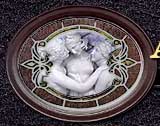|
Literary Commentary: The Mellowing of Early English Literature
In absorbing some of the Chaucerian tales, I find myself comparing them to more heroic
literature nearly a thousand years previous, primarily in the area of exposition. The
objects of focus seem more casual and physically descriptive. Older tales, epic poems
in particular, seemed to concentrate on building up the wonder and power of their heroes
and their beasts, with occasional nods to the local architecture if it was impressive enough.
Their storytelling style seemed to assume that the reader would garner all the corporeal
information he or she needed from how ornate the armour and jewelry were, but that the
hero could be visualized from abstract qualities such as generosity and strength. It's
been discussed that this might be because of the outlook of the times: nature loomed outside
the light of fires, an unknown and malignant force from which humankind was forced to carve
a comfortable niche, so the greatest stories must function as inspirational pieces. The
deeds were the important thing, not the warts on one's face.
I believe that the growth of civilization - especially in the form of permanent cities and
steadily-growing populations - eased the telling of tales somewhat, so that writers could
choose to focus on seemingly extraneous details and backgrounds. Having a structured society
in which to live, without constant threat of attack by animals and other men, meant that one
concentrated on other things, like politics or making money or chasing members of the opposite
sex. Humor could be introduced. Personal histories that weren't necessarily lists of lineage
could be related. The tales became for entertainment rather than posterity (this is not to say
that humankind has not told stories for entertainment for time out of mind, nor to say that
people do not still tell important tales, for it has, and they do; however, I daresay that
the stories-as-pastime probably evolve much more to match changing culture, changed upon whim,
than archetypal grand tales of heroism).
In the case of the Canterbury Tales, I noticed more physical description and (the narrator's)
personal opinion regarding the characters within them; not only could a person be mighty or
generous or wise, but friendly and lecherous and studious. We could learn what people were
wearing and what they did for a living, what they liked to eat, how many men or women they'd
chased recently, and of course the warts on the face. We have the leisure of reading a tale
about the telling of tales. We also read description of the surroundings: we discover what
kind of day it is, and what time of year. In older tales we would learn from whom the hero was
descended, but couldn't know if he slew the beast on a rainy day in September. Nature itself
was the threat, not the mood-setting environment for the threat.
It seems to me that because civilization had pushed nature further away, nature had become an
object for description, a setting for the tale, rather than a metaphor for the antagonist.
Characters became mortals in a world of other mortals, rather than mortals striving against
greater powers. They no longer had to be people to admire or strive to emulate, but could simply
be people.
For Reference:
Beowulf
Geoffrey Chaucer's Canterbury Tales
David Elsensohn, March 2005
Return to Essays
|

